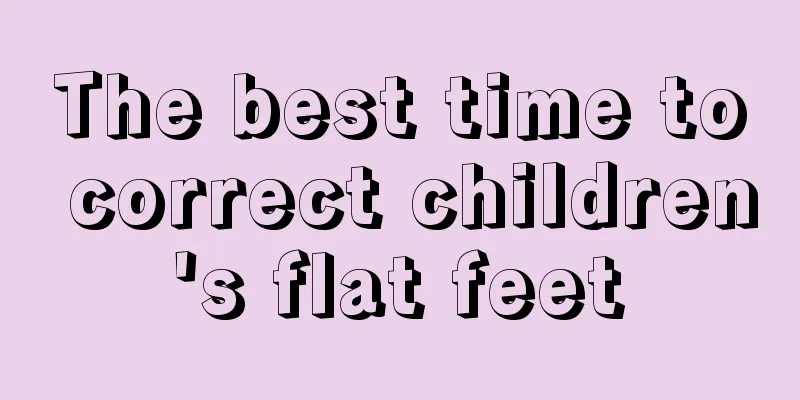The best time to correct children's flat feet

|
In life, many children suffer from congenital flat feet. Generally, flat feet are caused by family genetic factors. In fact, flat feet are a phenomenon of deformed development of the human foot. For people with flat feet, long-term running and walking will make their feet feel particularly painful. Many parents want to correct their children's flat feet when they are young. So what is the best time to correct children's flat feet? Flat feet can be divided into congenital flat feet and acquired flat feet. Congenital flat feet are hereditary flat feet; acquired flat feet are mostly caused by long-term wearing of heeled shoes or trauma. Congenital hereditary flat feet can only be solved by surgery, while acquired flat feet can be treated by choosing P-type negative heel shoes. Negative heel shoes are a significant scientific and technological advancement recognized by the country, and have been included in university textbooks and become part of medical textbooks. The function of negative heel shoes is to force the center of gravity to move backward, reduce the pressure on the forefoot, help prevent further aggravation of flat feet, and improve the quality of life. To determine whether negative heel shoes are effective, you can do a simulation test: barefoot or wearing socks, step on a book about 2 cm thick with the forefoot, and touch the ground with the heel. The experience time should not exceed your own tolerance. Rest in time when you are tired. Experience it in small amounts and multiple times for a period of time to experience whether the symptoms of the feet are alleviated. If you feel that this experiment helps, it will be better to wear P-type negative heel shoes.
The initial symptoms of flat feet are fatigue, soreness and pain in the feet after standing or walking for too long, heat in the soles of the feet, and swelling in the center and instep of the feet. These are the initial symptoms. After the middle stage, his pain will become more severe and he will not be able to stand or walk for long. In the late stage of flat feet, running, jumping and walking long distances are extremely difficult. The walking gait is heavy, inelastic and unable to absorb shock. The weight-bearing joints such as the ankles, knees, hips and waist, that is, the entire movement joints, will develop traumatic arthritis over time. Flat feet can also cause a variety of diseases such as valgus and pigeon-toed feet. Of course, the three elements of the arch of the foot are bones, muscles, and ligaments. Some people are born with flat feet, but if they exercise seriously on a daily basis and strengthen their muscles, it will not be greatly affected after they become adults. How to detect if your child has flat feet? Please note that almost 100% of children have flat feet when they are just born, and 90% have flat feet before the age of two. After that, the flat feet gradually decrease year by year, and the arch of the foot begins to slowly develop. If the child is already 3 or 4 years old and complains of pain after walking or standing for a long time, parents should pay attention and have the child checked for flat feet.
Step 1: Go barefoot, wet the soles of your feet, find a dry floor or newspaper, and step on it with normal force to look for footprints. Step 2: Check whether the hindfoot is everted. Step 3: Check whether there is any bulge on the inside of the foot. Step 4: Check whether the forefoot (in normal walking state) is abducted or turned inward (inward or outward) It is particularly important to note that the shape of the longitudinal arch of the foot under weight-bearing conditions and the foot structure may appear normal when sitting, but will undergo significant changes after bearing weight. |
<<: What to do if your child has a cough after eating cold food
>>: Symptoms of low intelligence in 3-year-old babies
Recommend
What to do if your baby has diarrhea after having a fever in August
Eight-month-old babies are very well-behaved and ...
What causes indigestion in children?
In life, our mothers may not give their children ...
2 month old baby diarrhea
With the continuous improvement of modernization,...
What are the causes of stomach pain in two-year-old babies?
Some babies always complain of stomachaches, but ...
Is bedwetting a disease in children?
Bedwetting is something that every child experien...
Children's fever reduction method selection
There are many families whose children have fever...
Two-year-old baby's head bone protrudes
As children grow, problems are more likely to occ...
Three major abilities that children need to master before entering primary school
After bidding farewell to three years of kinderga...
Why does the baby suddenly cry when he falls asleep?
Some babies cry a lot at night. The constant cryi...
How much clothes should children wear in winter
The phrase we hear most often in life is that the...
Why are there tears in the baby's eyes?
When it comes to tears, many people are familiar ...
When should you brush your baby's teeth?
Every day when the baby sees his parents brushing...
What are the benefits of babies sleeping on their stomachs?
Nowadays, many babies are the treasures of the fa...
What should children eat if they have less hair?
Some parents are particularly envious of other ch...
What should parents do if their baby lacks a sense of security?
The baby's dependence on the parents makes th...









